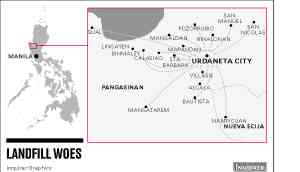Town to deny use of dump for 16 LGUs
URDANETA CITY—This city’s engineering sanitary landfill will stop serving other local governments by January 2017 to ensure that it continues operating for the next 10-12 years or until 2023, according to Mayor Amadeo Perez IV.
The Urdaneta facility should receive only 40 tons of garbage each day to operate within its life span, said Marjorie de la Cruz, officer in charge of landfill operations.
Every day the facility receives 50-70 tons of the city’s garbage, in addition to the 20-30 tons from the other towns, Perez said.
Perez said the city government does not intend to renew the contracts of its local government clients—the Pangasinan towns of Alcala, Bautista, Pozorrubio, Villasis, Binalonan, Mangatarem, Sual, Binmaley, Lingayen, Calasiao, Mapandan, Mangaldan, San Nicolas, San Manuel and Santa Barbara, and the town of Nampicuan in Nueva Ecija province.
Baguio City used to ship its garbage here but had since used the landfill in Capas town in Tarlac province.
Article continues after this advertisement“The sanitary landfill was established for exclusive use of Urdaneta, but we accepted the garbage of other towns that asked us to accommodate them. But now we have to stop and maybe by January next year, no other local government can use the facility,” Perez said.
Article continues after this advertisementUrdaneta is the only local government operating an engineered landfill in Pangasinan, and the second with a waste facility in the Ilocos region. San Fernando City in La Union also operates a landfill.
The facility spanning 6 hectares lies inside an 18-ha city government-owned property in Sitio Calegu in Catablan village.
Plans are being finalized for the installation of a methane extraction facility as a new phase for the landfill program, but Urdaneta has not decided on the appropriate technology for the city, De la Cruz said.
Perez said the city collects a P900-tipping fee for each ton of waste from its local government clients. But the city plans to triple the fee to P3,000 a ton to make it prohibitive for towns “which are required to build their own waste facilities.” Yolanda Sotelo, Inquirer Northern Luzon
